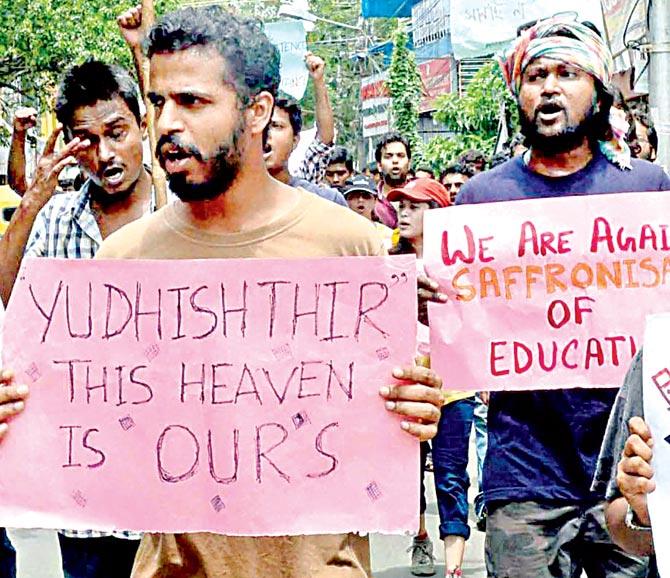As a middle-class kid, I received that lecture surely familiar to many readers: look, we can't afford to give you fancy stuff, but we can give you a good education. Use it well (yaniki fail mat hona)

Students protest the appointment of Gajendra Chauhan as FTII Chairperson
 As a middle-class kid, I received that lecture surely familiar to many readers: look, we can't afford to give you fancy stuff, but we can give you a good education. Use it well (yaniki fail mat hona).
As a middle-class kid, I received that lecture surely familiar to many readers: look, we can't afford to give you fancy stuff, but we can give you a good education. Use it well (yaniki fail mat hona).
Thanks to some excellent state subsidized institutions I did end up getting a pretty good education that has stood me in good stead through my life and contributed to my feeling I should give back to the place that made me what I am.
For various reasons I didn't go to film school. But had I chosen to, I could have tried to go to the Film and Television Institute of India (FTII) as many of my colleagues and friends did. It was a world-class film school where you learned to be fabulous camerapersons, sound recordists, editor, actors or directors – and do what students do: think, grow, argue, find your voice and make friends who go on to become colleagues.
It's a film school that's given us Raju Hirani and Saeed Mirza, Sriram Raghavan and Rajat Kapoor, Jaya Bhaduri and Rajumar Rao. Resul Pokutty may be the only sound recordist you know thanks to the Oscar for Slumdog Millionaire. But countless others are famous within the industry for their abilities and work on different features and documentaries, Indian and international.
Students protest the appointment of Gajendra Chauhan as FTII chairperson. Pic/ PTI
FTII's glory days are some way in the past, thanks to neglect and stagnation, though it still manages to turn out excellent people. But the appointment of Gajendra Chauhan (best known for his role as Yudhishthra in BR Chopra's 1988 TV series Mahabharat) as its Chairperson isn't going to remedy that and is in fact a severely elitist move.
Some object to Mr Chauhan's appointment because of his somewhat craven affiliation to the ruling party and because he has acted in a soft-porn film. These objections miss the point. In a democracy people have the right to any political affiliation, horrible or wonderful. To stigmatise someone's livelihood is moralistic and silly.
FTII is an institution which needs someone with administrative experience, a complex outlook, exposure to diverse worlds and markets of cinema, who does not confuse education with the market. There is a pettiness of vision in appointing someone ill-equipped for a job. It empowers neither the institution nor the person who is unequal to the task.
There is an under-current of thought that the left-liberal artsiness of film students is elitist and bastions of such thinking, like FTII, should be cut down to size. To dismiss art as elitist is to make art the domain of the elite – when in fact it's something all of us need in varied ways. We need a national vision that makes art and education a resource for all.
If indeed FTII is an elitist institution (the bathrooms could fool you) then the solution is not to throw a tantrum and make it mediocre. The result of mediocre universities is that those who can afford it, will send their kids to foreign schools. Those who can't will have to be forever handicapped by a poor education.
Applications to FTII are huge and getting in is tough. It should have a Chairperson who can create a kick-ass model that can be replicated around the country. More state supported films schools, means more people can access a good film education at Indian prices Only this can enrich and diversify our cinema culture whether commercial or not-so-commercial.
The student strike at FTII therefore represents an important set of issues for the future of education, including arts education. That the best should be available to more, not fewer people in a supposedly prosperous India.
Paromita Vohra is an award-winning Mumbai-based filmmaker, writer and curator working with fiction and non-fiction. Reach her at www.parodevi.com.
The views expressed in this column are the individual's and don't represent those of the paper.
 Subscribe today by clicking the link and stay updated with the latest news!" Click here!
Subscribe today by clicking the link and stay updated with the latest news!" Click here!





